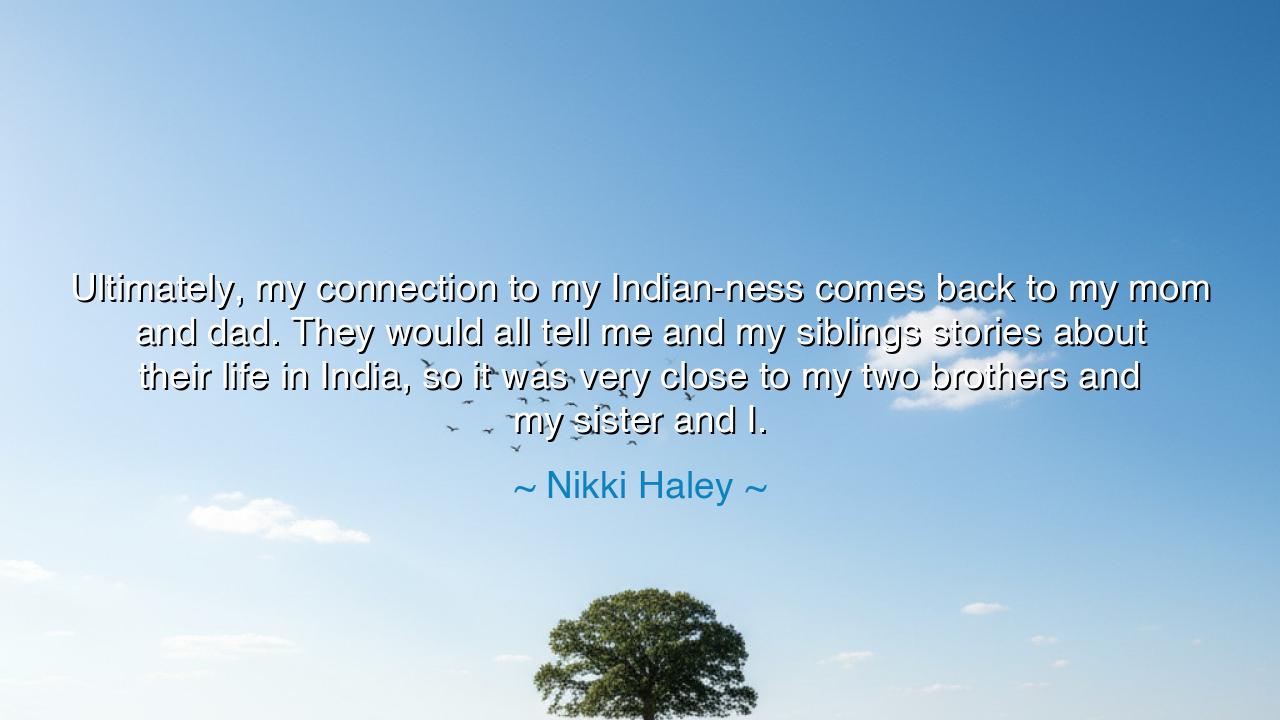
Ultimately, my connection to my Indian-ness comes back to my mom
Ultimately, my connection to my Indian-ness comes back to my mom and dad. They would all tell me and my siblings stories about their life in India, so it was very close to my two brothers and my sister and I.






In these gentle and heartfelt words, Nikki Haley speaks to one of the oldest truths known to humankind: that identity is not only born of the soil, but also of the stories we inherit. “Ultimately, my connection to my Indian-ness comes back to my mom and dad. They would all tell me and my siblings stories about their life in India…” In her reflection, there is no boast, no claim of pride alone — but a reverence, a sacred acknowledgment that who we are is a tapestry woven from the voices of those who came before. Her parents, through their memories, gave her not just a heritage, but a living connection — a bridge between lands, between centuries, between hearts.
The meaning of this quote is found in its deep understanding of cultural memory — that our truest roots are not merely geographic, but spiritual and emotional. Haley reminds us that heritage is not static, not a relic sealed in books or monuments, but a fire passed from parent to child, kept alive through remembrance. When she speaks of her parents’ stories, she is invoking the ancient power of oral tradition, through which nations, faiths, and families have survived exile, change, and time. These stories — of home, of struggle, of love — are what make a people eternal. And in remembering them, we are not just recalling the past; we are keeping it alive within us.
Haley’s reflection arises from her own journey — a child of Indian immigrants, born in South Carolina, raised between two worlds that did not always seem to understand one another. In such a place, one’s identity can become blurred, even fragile. But through her parents’ voices, she found her anchor. They told her of India, not as a distant land, but as a living presence — of its colors and faiths, its songs and sorrows. In hearing their tales, she was not merely learning about a country; she was inheriting its soul. From those family stories, she drew a sense of belonging that would later guide her through the storms of politics, leadership, and life.
This theme echoes across the ages. Consider the Jewish people, scattered across the world for millennia, yet never losing their sense of identity. They carried not palaces or armies, but stories — the tales of Abraham and Moses, of exile and deliverance — and those stories preserved them when nations rose and fell. Or think of the African griots, who through centuries of hardship remembered their ancestors in song, keeping alive entire civilizations through the power of memory. Haley’s words, in their modern simplicity, echo this timeless truth: that to remember where you came from is to know who you are.
The origin of her insight lies in the universal experience of the immigrant family — the sacred act of transmission between generations. Her parents’ stories were not just nostalgic tales; they were acts of cultural survival. Every parent who tells a child about “the old country,” about traditions, about language and sacrifice, is doing the same holy work — binding the past to the future. For when the world pulls us into constant motion, it is these memories that keep us from being lost. They remind us that behind every success, every ambition, stands the unseen labor of ancestors, whose dreams became our inheritance.
The lesson of Haley’s quote is profound: never forget the power of storytelling within your own family. Each tale told by a parent or grandparent is not small — it is a seed of identity, carrying within it the wisdom, humor, and endurance of generations. Listen to these stories while you can; ask about your roots; let your history speak to you. For in the rush of modern life, we often chase progress at the cost of memory. But a person who forgets their past becomes a tree cut from its roots — alive, perhaps, but without nourishment, without song.
Therefore, my child, learn from Nikki Haley’s remembrance. When you feel adrift in a world that demands you choose between cultures, careers, or selves, return to the voices that first taught you love. Let your heritage not divide you, but enrich you. Share your parents’ stories with your own children, so that they too may walk with the strength of generations behind them. For identity is not a flag or a face — it is the flame passed from hand to hand, from heart to heart, from age to age. And as long as we remember, that flame will never die.






AAdministratorAdministrator
Welcome, honored guests. Please leave a comment, we will respond soon